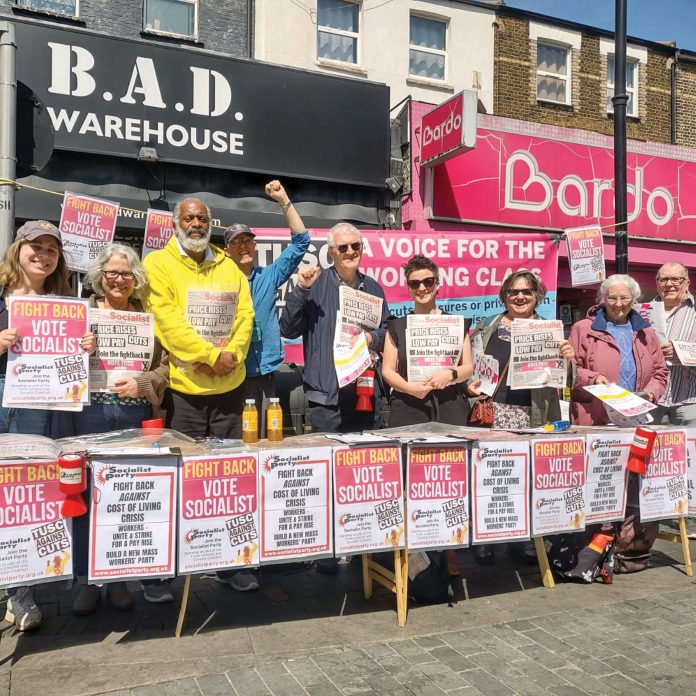Trade Unionist and Socialist Coalition (TUSC) press release
The latest meeting of the Trade Unionist and Socialist Coalition (TUSC) All-Britain steering committee, held on 15 June, saw a detailed discussion begin on plans for the next general election. This must be called no later than December 2024, but recent political developments have shown that it could be a lot earlier than that. And with the consolidation of Tony Blair-style ‘New Labour’ politics within the Labour Party, the committee agreed, working-class voters are once again set to be effectively disenfranchised.
To meet this situation TUSC strongly hopes that, before the election, steps towards a new vehicle for working-class political representation will have been taken by more authoritative forces than those currently involved in our coalition – primarily from the trade unions or potentially around Jeremy Corbyn himself standing independently of Labour in the general election.
But it is also possible that such steps might not have been taken in time for the next election and that therefore a TUSC challenge would be necessary. This was the theme of the discussion at the steering committee – hope for more, but prepare for a TUSC challenge – around a briefing document prepared by the TUSC national agent, Clive Heemskerk.
While recent conferences of both the Fire Brigades Union and the Aslef train drivers’ union voted to remain affiliated to the Labour Party, this will not be the last word on this issue, in these unions or others. Developments towards a new political vehicle for workers could be accelerated by many factors, including the growing wave of industrial action showing to ever-wider numbers which side the new New Labour politicians are on.
And Labour’s own general election planning could also push things forward. Its continuing retreat from the radical policies in the 2017 and 2019 manifestos put forward under Jeremy Corbyn’s leadership will be one factor. And its candidate selection process will be another.
Local constituency Labour parties in non-Labour seats are beginning to select their parliamentary candidates while trigger ballots on whether sitting Labour MPs will face a full selection vote in the autumn are also underway. Labour’s aim is to have a full list of general election candidates in place by March 2023, just eight months away.
So the question will be posed quite soon: who will be the candidate that trade unionists, socialists, and working-class community and social movement campaigners should back in Jeremy Corbyn’s seat of Islington North? What will happen to the Labour Socialist Campaign Group MPs in Merseyside in the coming months, where the Labour NEC decided last year that all selections would be taken over by the national party until 2026?
Will the Labour leadership and its supporters allow the Socialist Campaign Group MP Apsana Begum to stand again in Tower Hamlets, with its new Aspire-led council elected in opposition to the local Labour Party’s cuts policies? And so on.
It may be possible then that a wider coalition than TUSC currently is could be in place by the next general election.
But at this point in time it is also clear that there is no more developed individual party or coalition than TUSC that would be able to organise a significant all-Britain socialist and trade union-based challenge at a general election – this year if events necessitate it, or in 2023 or 2024. And that plans need to be made accordingly.
On this basis the steering committee agreed:
- A target of 100 candidates standing on a TUSC list, in order to reach the qualifying threshold for ‘fair media coverage’ including a party election broadcast
- A national election fund with a target of £60,000, to guarantee the £500 per seat election deposits of the 100 candidates and the broadcast costs
- Other organisations considering standing candidates who will not be able to contest 100 seats themselves should be asked to use one of the TUSC descriptions as a contribution to reaching the broadcast threshold, albeit with the provision for joint descriptions registered with the Electoral Commission allowing some flexibility
The TUSC conference to be held in February 2023 will focus on the general election and, along with the process to draft a core policy platform for the election, will be opened up to wider participation.
Feedback welcome
The full briefing document – covering issues around the party election broadcast regulations, ballot paper descriptions, election finances, and proposals for agreeing a minimum core policy platform – is available at tusc.org.uk/txt/475.pdf.
The steering committee would welcome any comments or observations from individuals or organisations considering standing in the next general election, whether they are currently participating in our coalition or not, which can be sent to the TUSC national agent at [email protected]








